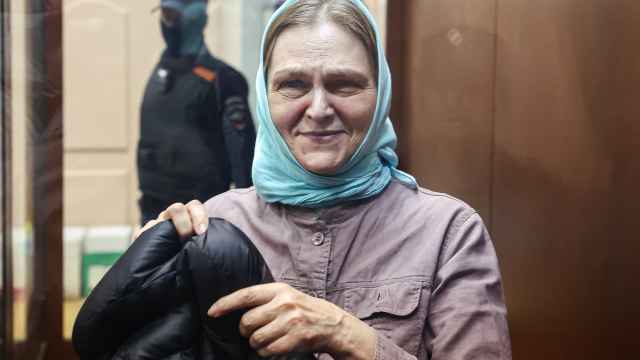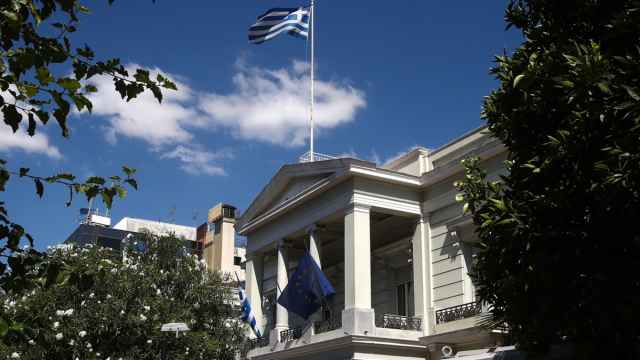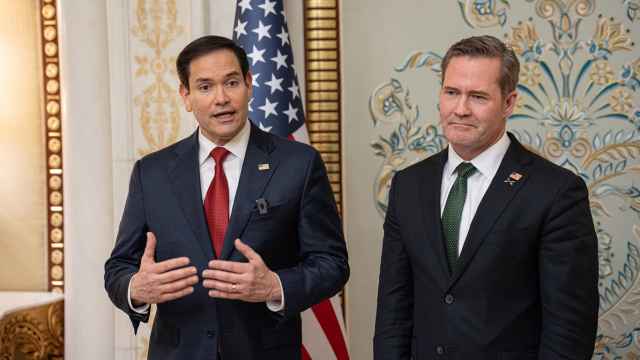BIROBIDZHAN, Jewish Autonomous Region — When Alexander Gan fled the demise of Soviet-era industry in Siberia’s Jewish autonomous region in 2000, it was a swampy backwater seven time zones east of Moscow. A decade later, its border with resource-hungry China is bringing work with iron ore, copper and coal producers.
Gan, 48, left Russia’s Far East to find a job, part of an exodus that shrank the regional population by 22 percent from 1990 to 2011, the fastest rate in the country. His return from Israel to the Jewish enclave set up by Russian dictator Joseph Stalin in 1934 fits in with plans by President-elect Vladimir Putin to meet Chinese demand for raw materials.
“It was hard to live here after the U.S.S.R. collapsed; there was no proper work, industry wasn’t developing,” Gan said in his birthplace of Birobidzhan, a town on the Trans-Siberian Railroad an hour-and-a-half drive to the frontier with China. “We are at the start of regional development and recovery. This is good, but not yet enough. We hope it’s just the beginning.”
More than two decades after the Soviet Union lost its European satellite states, the axis of Russian development is tipping to the east as rail, pipeline and resources companies gravitate toward Asia.
Gan found a job as a fitter and metal turner at IRC, a Hong Kong-listed mining company that gets 90 percent of its sales from China.
IRC plans to employ 1,800 at the Kimkan Sutara iron ore mine where he works. Baikal Mining, a unit of billionaire Alisher Usmanov’s Metalloinvest, may hire as many as 20,000 to develop the Udokan copper deposit in eastern Siberia.
Putin is pushing development of the Far East and eastern Siberia, and with it a revival of some mines dating back to Tsar Nicholas II, after winning another six-year term as president. During campaigning for the March 4 election, he said a state corporation was needed to speed up projects.
Putin’s first deputy, Igor Shuvalov, may be a candidate to head the body, Vedomosti said last week. Russia may use earnings from the 2.6 trillion-
ruble ($90 billion) National Well-Being Fund, it reported, citing a law drafted by the Economic Development
Ministry.
“The driver of Russia’s development isn’t in Europe any more, it’s in Siberia,” said Artyom Volynets, chief executive officer of En+ Group, billionaire Oleg Deripaska’s mining and energy holding company. “China has emerged as a major economy in the last decade and is ready to consume commodities from across the border. If we don’t do it, somebody else will: Africa or Australia.”
China’s economy grew 9.2 percent last year, matching the slowest pace since 2002, as the housing market cooled. That’s still more than double the 4.3 percent expansion in Russia.
Volynets, who left his home on Russia’s volcanic Kamchatka Peninsula 6,800 kilometers from Moscow to live in Washington and London, now jets between the nation’s capital, Siberia and Hong Kong for En+. He worked and studied in the United States from 1991 to 1997 and then in London until 2003, where he was employed as a corporate finance adviser.
With China’s emergence as the biggest commodities consumer, Volynets said his country needs to encourage more people to live and work in the Russian Far East and eastern Siberia regions, a territory accounting for 60 percent of the nation’s land and 8 percent of its people.
The state won’t be able to exile prisoners into Siberian labor camps like Stalin, who also sought to stifle Zionist calls for a home in Palestine by setting up the Jewish autonomous region. Instead it will need to lure workers to the region by ensuring employment and building roads, houses and schools.
The Far East lost more than 20 percent of its population from 1990 to 2011, according to data compiled by Andrei Kokoshin, a former deputy defense minister now at the Russian Academy of Sciences. To reverse the trend, Russia must provide startup funds and cheap mortgages, he said.
At least $425 billion of investment is needed by 2030, with the state providing a quarter of that, or $6 billion a year, six times its rate of spending in the past decade, Kokoshin said.
Among the prizes for companies ready to join the government in opening the territory are Udokan, the world’s third-largest copper deposit, with resources of 25.7 million metric tons of the metal, and Russia’s top coking coal site, with 2.2 billion tons, in Elga.
The drawback for investors is the cost of operating in the region, said Pavel Maslovsky, the founder of London-listed gold mining business Petropavlovsk Plc and its iron ore unit IRC.
“The only advantage is its natural resources,” he said. “A steel mill there will be uncompetitive compared with western Russia or China, where labor and electricity are cheaper and the climate is better. The tsarist minister Pyotr Stolypin gave out land for free there to motivate people to move. It’s possible to subsidize power tariffs, maybe create a special tax regime.”
Other options lie over the border, where Chinese business has funding for projects that yield the raw materials it needs.
Among works that have won money from China is a 6,000-kilometer oil pipeline from Siberia to Daqing, near Harbin. China overtook Germany as Russia’s largest trading partner because of the line. Russia also plans to ship Siberian gas to its neighbor, helping to boost trade to $200 billion by 2020, according to Putin.
Further cementing ties between the two nations, China State Grid Corp. plans to study a 2,350-kilometer transmission link to bring power to its northeast from Siberian plants, Volynets said.
A venture between Deripaska’s Eurosibenergo and China Yangtze Power proposes to build power stations, while IRC plans to construct a $300 million rail link, including a bridge across the Amur River from the Jewish autonomous region.
In Birobidzhan, the administrative center of a district that makes up just 36,000 of the Far East federal area’s 6.2 million square kilometers of land, Gan is content to be back.
His daughter has stayed in the Russian Far East after getting married and his son returned to the family home following a stint away in the army.
“My life is stable now,” he said. “If more companies such as IRC come to the region, life would be better here.”
A Message from The Moscow Times:
Dear readers,
We are facing unprecedented challenges. Russia's Prosecutor General's Office has designated The Moscow Times as an "undesirable" organization, criminalizing our work and putting our staff at risk of prosecution. This follows our earlier unjust labeling as a "foreign agent."
These actions are direct attempts to silence independent journalism in Russia. The authorities claim our work "discredits the decisions of the Russian leadership." We see things differently: we strive to provide accurate, unbiased reporting on Russia.
We, the journalists of The Moscow Times, refuse to be silenced. But to continue our work, we need your help.
Your support, no matter how small, makes a world of difference. If you can, please support us monthly starting from just $2. It's quick to set up, and every contribution makes a significant impact.
By supporting The Moscow Times, you're defending open, independent journalism in the face of repression. Thank you for standing with us.
Remind me later.





